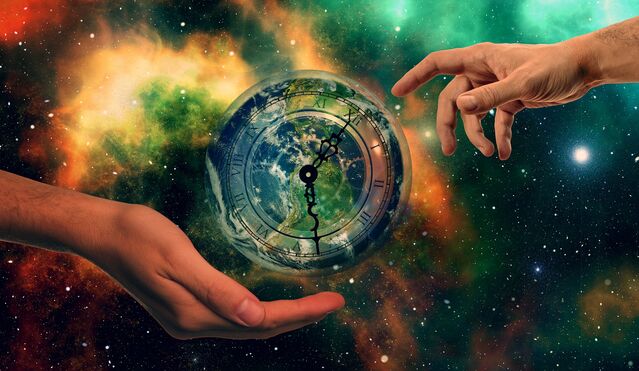Spirituality
The Spirituality of Linear Time
Life without the passage of time may not be all it's cracked up to be.
Posted May 10, 2022 Reviewed by Michelle Quirk
Key points
- Without the passage of time, we would simply exist. No more decay, aging, or dying.
- Time is the measurement that we ascribe to passing events; it's nothing apart from things that change.
- For us as human beings, it is the unfoldment that defines our existence.
What if we experienced existence with no passage of time? This hypothetical scenario suggests that what came before now is no different than what is now, or what is to come. We would simply exist. No more decay, aging, or dying. No more schedules, being on time, or passage of time.
Linear Time
Most people would define linear time as a ticking clock, forever uniformly marching forward with 60 seconds in a minute, 60 minutes in an hour, 24 hours in a day, and 365 days in a year. We get much of our modern notion of time forever marching forward from Sir Isaac Newton, one the fathers of modern mathematics as well as a contributor to modern physics. What Newton gave us was the insight that there are three laws of motion that govern the relationship among objects and the known forces of nature. If this relationship is to hold, then time must be “absolute”; otherwise, Newtonian mechanics would not hold true in all cases.
So, from a Newtonian point of view, time is absolute.1 We experience time because we experience ourselves and things moving around. This is obviously true when you think about whether it is day or night in different places on Earth. It isn’t the same time in New York as it is in Sydney because the Earth is moving. In his essay in the Journal of Philosophy nearly 100 years ago, W.H. Sheldon wrote that time is, "nothing apart from things that change."2 In this sense, time is the measurement that we ascribe to passing events. So, no more time would mean no more passing events, and no change. Sounds great, doesn’t it? No more linear time.
Let’s think carefully about this. In our linear existence, each moment occurs as a point in time. Right now, we all exist in this moment in time. Once we move along the continuum of passing time beyond this point, where we are now becomes the past. The future doesn’t exist, yet. None of us can go back to the past to change something we didn’t do or retrieve something we left behind—that is, unless we unlock the secret of time travel (which is theoretically possible). And none of us know what will occur in the next future moment.

Not only do we not know what will occur in the future, but what each of us does in this now moment shapes the next future moment. In this way, time and quantum science have a lot in common. Quantum science basically says that when we as observers show up to a situation, physical reality is altered. This suggests that our linear-bound lives are shaped by every person, creature, and thing showing up every moment, each in their unique way, and changing reality for all of us. And no one has any idea what that reality will be until the next moment occurs. Our existence unfolds with each passing moment. Time is the measurement of the unfoldment. Without linear time, there would be no unfoldment.
Explorers of the Unknown
Now there’s the rub. For us as human beings, it is the unfoldment that defines our existence. In this sense, we are explorers of the unknown. We are constantly exploring our lives day by day, encountering the previously unknown and searching for new knowledge in the next moment.
Furthermore, because our lives unfold with the events of each now moment shaping each future moment, when taken together to include every person, creature, and thing, our collective existence can be thought of as a sort-of self-completing whole.3 It is self-completing because, in our collective unfoldment, the next stage of our existences, both individually and collectively, is brought about by all of the earlier stages. And the earlier stages exist solely because of the next stage they brought about. Linear time isn’t a curse; it’s a gift. Would you really find life worth living if you knew what was going to happen?
References
Newton’s Views on Space, Time, and Motion, The Stanford Encyclopedia of Philosophy. https://plato.stanford.edu/entries/newton-stm/
W. H. Sheldon, The Spirituality of Time, The Journal of Philosophy, Vol. 23, No. 6 (Mar. 18, 1926), pp. 141-154
W. H. Sheldon, The Spirituality of Time, The Journal of Philosophy, Vol. 23, No. 6 (Mar. 18, 1926), pp. 141-154


